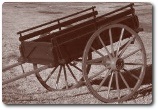Tess of the d'Urbervilles Contents
- Social / political context
- Religious / philosophical context
- Chapters 1-9
- Chapters 10-19
- Chapters 20-29
- Chapters 30-39
- Chapters 40-49
- Chapters 50-59
- Tess as a 'Pure Woman'
- Tess as a secular pilgrim
- Tess as a victim
- The world of women
- Tess as an outsider
- Coincidence, destiny and fate
- Disempowerment of the working class
- Heredity and inheritance
- Laws of nature vs. laws of society
- Modernity
- Nature as sympathetic or indifferent
- Patterns of the past
- Sexual predation
- Inner conflicts: body against soul
Chapter 6
Synopsis of chapter 6
Tess stays overnight in Shaston before returning home. A letter, supposedly from Mrs. d'Urberville, awaits her, inviting her to become the poultry-maid. Keeping hens is a hobby of the old lady, it appears.
Tess is undecided, as she is not happy about Alec, but when he rides over a week later, for an answer, her family is very impressed. After further wavering, Tess agrees, and is told to be ready in two days time. Transportation will be sent to collect her from the end of the valley.
Commentary on chapter 6
prefigurative superstitions, ill omens: although we might suppose Hardy to dismiss country superstitions, he does in fact use them to ‘prefigure' much of the plot, thus creating a sense of fate or inevitability. For a full discussion of Fate and Destiny, see Determinism and Free will
improving his blood by linking it to the old line: In the cultural thinking about heredity in Hardy's day, it is the old line that improves itself by linking on to new blood. Jack Durbeyfield thinks of it the other way round, not without some ironic agreement from Hardy, who clearly thinks very little of the new d'Urberville blood.
walking among the gooseberry-bushes: traditionally, gooseberries and sexual deception are linked
Social context
What Tess's parents don't seem to be aware of, but which would be well-known to Hardy's readers, is the long history, in fact and fiction, of the sons of wealthy families taking advantage of the various young servant girls employed around the house. Marriage was not the result of such encounters, dismissal of the girls being the more usual result. This is one of the unspoken subtexts of the narrative.
Time
Hardy specifically mentions the roses blooming in early June. A timeline would suggest Tess's birthday must be in June or early July. Here, she would be turning 17.
Vocabulary
brought 'em round: won their approval
dolorifuge: painkiller
'ee: dialect form of thee, which, again, was still used in dialects for the familiar form of you.
emolument: wages
fairlings: little trinkets bought at fairs
pedestrian: usually means on foot, but has a secondary meaning of very  ordinary, even anticlimatic.
ordinary, even anticlimatic.
'prentice: apprentice, nearly all trades being then taught through apprenticeship, however minor.
spring-cart: a cart with springs to it, and, therefore, more comfortable for passengers.
Investigating chapter 6
- What do you think is ‘prefigurative' about the rose-thorns piercing Tess's chin?
- What is it makes Tess so indecisive?
- Why is Joan described as ‘witless'?
- In what ways does Hardy continue to undermine the d'Urbervilles' credibility?
